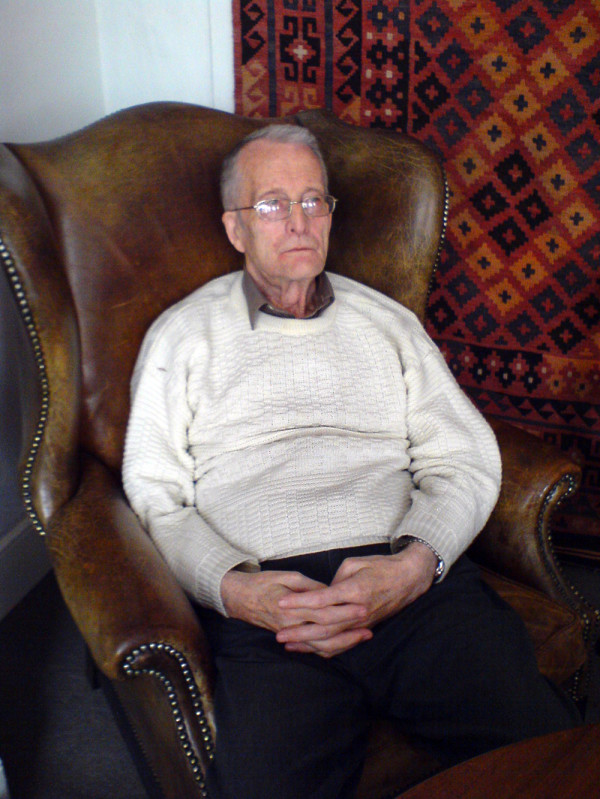Stewart Irwin was born in 1923 and died in 2012 aged 89. He lived in a town in Oxfordshire in the UK.

Stewart was a freelance commercial artist who also painted for pleasure because he was compelled to do so.
He was conscripted to the army in 1942 and served until 1947. Stewart suffered a breakdown relating to his experiences during the war, earlier health problems and childhood.
Stewart was gay, which was a criminal offence in the UK until he was 44 years old. He went to Campaign for Homosexual Equality meetings at Reading University, and then went on to host them. I heard him say that he was once propositioned by one of the Krays, notorious East End gangsters.
He was a vegetarian and a lover and believer of mysticism and esotericism.
Stewart was my friend.
We met in 2003 when I was an oral history worker on a project called Before Stonewall. I made some flyers and spread the word that I was looking for lesbian, gay, bisexual and transgender people aged 55 and over. I was inviting them to talk on camera about their lives, particularly pre-gay liberation. One of Stewart’s friends got in touch, so did Stewart, and I interviewed them both.
Stewart was the oldest person that I interviewed, he was nearly 80 at the time. I had been intimidated by him when I’d called to arrange the meeting, but I warmed to him in person. He was cranky, sardonic, funny, an oddball – like me! I kept him informed of the progress of his interview. We kept in touch via letters, occasional phonecalls and visits when the project ended. I bought one of his paintings and he gave me others. He came to be a treasured friend.
I never really knew my own grandparents, but I had spent plenty of time with older people. I’d been a care worker, my mum was a geriatric nurse and had friends who were much older than her. I greatly enjoy the company of older people, and don’t get to do it much. In the UK at least, there are few intergenerational social spaces where you might make friends, especially in queer life.
Stewart was someone I would have wanted to be friends with at any age. I was 34 years old at the time I met him, and he was 46 years my senior. I was always aware of our ages. Sometimes age, gender and class differences intruded; he shielded me from passing traffic on the street. Mostly the difference was there but didn’t matter. In our letters we talked about our friends, my work, art, his frustration at trying to sell his work, his past, his health, queerness, beliefs, sex, death. We had ten years of top quality friendship.

Around 2011 his letters petered out somewhat. Stewart had an increasing number of health crises and I was too embroiled in my work to be much help. I got a call from his friend, the same person who had introduced me to him years previously. He told me that Stewart had been in a bad way and was now living in a home where he was doing well and was happy. It was difficult to contact Stewart but my girlfriend and I went to see him in January 2012.
This was the last time I saw him. There was a lot of frost on the ground. He was unsteady on his feet and took us for a walk around the garden, we had a good talk. We both knew he didn’t have much time left. He grabbed my hand tightly when I said that I would miss him. As we drove away, Stewart mugged at the window, waving wildly, making me laugh. At every step in our friendship we had been able to express that we each thought the other was wonderful. His paintings are all over my house, and even adorn a couple of coffee mugs. I enjoy them every day, and remember him each time I see them.
From his memorial service: A Celebration of the Life of Stewart Irwin (.pdf)
If you would like to know more about our friendship, our correspondence has been archived at the Bishopsgate Institute.
Please get in touch if you have biographical details you would like to add.